Report of the
13th Annual Conference of the International Environment Forum
integrated into the
33rd Annual Conference of the Association for Baha'i Studies - North
America
on the theme
Environments
Marriott Wardman Park Hotel, Washington, D.C., USA
13-16 August 2009
CONFERENCE PROGRAMME
13th ANNUAL CONFERENCE BLOG
with Session Reports, PowerPoints, papers, photos, links and more
Photographs on
flickr
Environments
“The teachings of the Bahá'í Faith shed light on the dialectical relationship between the human soul and its environment. As Shoghi Effendi explained, “We cannot segregate the human heart from the environment outside us and say that once one of these is reformed everything will be improved. Man is organic with the world. His inner life moulds the environment and is itself also deeply affected by it. The one acts upon the other and every abiding change in the life of man is the result of these mutual reactions.” The nature, quality, and condition of the environments we inhabit therefore have profound implications for human well-being. In this context, how can science and religion, as complementary systems of knowledge and practice, be applied more effectively to the preservation, refinement, and improvement of the myriad environments – natural, cultural, and built – within which we live and grow?” [From the Association for Bahá’í Studies web site announcing its 33rd annual conference].
The 13th IEF conference was fully integrated into the Association for Bahá'í Studies conference, including plenary speakers and two breakout sessions for contributed papers. The IEF President, Dr. Arthur Dahl, gave the opening plenary at the conference, and Professor Peter G. Brown was a featured outside lecturer at the IEF-organized plenary session. See IEF Conference Programme. The conference attracted nearly a thousand participants from 20 countries, with many parallel sessions. This report covers only the IEF-organized sessions. More complete reports on each presentation are on the conference blog at http://iefconf2009.wordpress.com/.
A report on the conference was released on the Bahá'í World New Service at http://news.bahai.org/story/728, and the Canadian Bahá'í News Service also provided coverage at http://www.bahainews.ca/en/090831-abs.
THURSDAY, 13 AUGUST 2009
In an afternoon pre-conference workshop on Values-based Indicators of Sustainable Development, Dr. Arthur Dahl introduced an EU-funded project to develop values-based indicators of education for sustainable development (http://www.esdinds.eu/) launched in early 2009. The project is being jointly undertaken by a number of European-based partner organizations that strive to apply spiritual principles and values in their work with communities, schools, businesses and other groups. It is often difficult to demonstrate the results of such efforts in values-based education. In this project, academic researchers from the University of Brighton (UK) and Charles University in Prague are helping the Earth Charter Initiative, the Alliance on Religions and Conservation, Peoples' Theatre, and the European Baha'i Business Forum to find indicators of these important but intangible factors that they can use in their work.
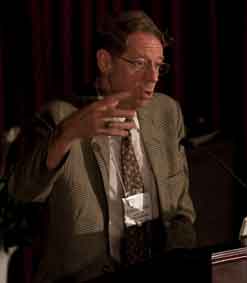
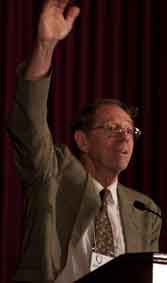 After the conference opening Thursday evening, IEF President Arthur
Dahl gave the opening plenary talk on Transforming
Environments from the Inside Out (see powerpoint
presentation, audio recording,
and full text). He pointed out that climate
change and the financial crisis are symptoms of an unsustainable world
economy hitting planetary limits. The necessary rapid transformation faces
barriers deeply rooted in our psyche, values and institutions, requiring
spiritual as well as scientific solutions. The Baha'i concept of oneness
requires an integrated perspective and a profound reconsideration of every
dimension of our lives, society and environment. Rather than falling into
a doomsday depression, we need to see the present chaos as an opportunity
to provide spiritual and intellectual leadership to transform our personal
lives, families, communities, nations and the emerging world society from
the inside out.
After the conference opening Thursday evening, IEF President Arthur
Dahl gave the opening plenary talk on Transforming
Environments from the Inside Out (see powerpoint
presentation, audio recording,
and full text). He pointed out that climate
change and the financial crisis are symptoms of an unsustainable world
economy hitting planetary limits. The necessary rapid transformation faces
barriers deeply rooted in our psyche, values and institutions, requiring
spiritual as well as scientific solutions. The Baha'i concept of oneness
requires an integrated perspective and a profound reconsideration of every
dimension of our lives, society and environment. Rather than falling into
a doomsday depression, we need to see the present chaos as an opportunity
to provide spiritual and intellectual leadership to transform our personal
lives, families, communities, nations and the emerging world society from
the inside out.
FRIDAY, 14 AUGUST
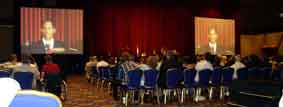 The Friday morning plenary session was also organized by IEF on the theme
Collective
Consciousness, Human Maturity and the Challenge of Sustainability,
and was moderated by Tahirih
Naylor of the Baha'i International Community. The upsurge in
environmental, social and economic challenges confronting humanity in the
21st century -- climate change, species extinctions, deforestation, food
security, inequality, growing extremes of wealth and poverty, and an
unstable world financial system, to name but a few – are forcing the
collective consciousness of humankind to evolve. These challenges are
ever-present reminders of humanity’s essential oneness and the
interconnectedness of all life systems. Learning to successfully grapple
with them will require new levels of human maturity and narrow self
interest will have to give way to a wider concern for the well-being of
the planet.
The Friday morning plenary session was also organized by IEF on the theme
Collective
Consciousness, Human Maturity and the Challenge of Sustainability,
and was moderated by Tahirih
Naylor of the Baha'i International Community. The upsurge in
environmental, social and economic challenges confronting humanity in the
21st century -- climate change, species extinctions, deforestation, food
security, inequality, growing extremes of wealth and poverty, and an
unstable world financial system, to name but a few – are forcing the
collective consciousness of humankind to evolve. These challenges are
ever-present reminders of humanity’s essential oneness and the
interconnectedness of all life systems. Learning to successfully grapple
with them will require new levels of human maturity and narrow self
interest will have to give way to a wider concern for the well-being of
the planet.
The first keynote on The Essential Role of Religion in Fostering a Sustainable World by Peter Adriance (see audio recording and presentation) started with a reflective multimedia presentation on environmental stewardship from a faith perspective. Religious communities are experiencing a vital reawakening to the moral imperatives that ensure sustainability, including the recognition that religion and science must work harmoniously to resolve pressing environmental problems. A variety of responses are evident, including examples from the Bahá'í community. The processes of expansion and consolidation, currently the major focus of the community, lay the essential foundation for even greater levels of social action.
In the second keynote Right Relationship: Building a Whole Earth Economy, Dr. Peter G. Brown (see audio recording and presentation), co-author of a 2009 book with the same title, began with the idea that human well-being is entirely dependent on the well-being of the whole commonwealth of life. Answers to five key questions further illuminate these concepts: What is the economy for? How does it work? How big should it be? What is a fair distribution of its benefits and burdens? How should it be governed? He offered answers that provided a fresh perspective and hopeful guide that resonates well with diverse faith traditions.
In response, Dr. Arthur Dahl (audio recording) provided reflections from a Bahá’í perspective on the themes and ideas presented in Dr. Brown’s talk. He noted the convergence of science and religion, with the scientific concept of evolution and continuous change reflected in the religious concept of progressive revelation. Bahá'í involvement in the environment goes back to the 1920s and 30s, with Richard St. Barbe Baker's reforestation work in Africa, Palestine and eventually the whole world. The first life member of his association "Men of the Trees" was Shoghi Effendi, Guardian of the Bahá'í Faith. Another early environmentalist was Vinson Brown, whose book with Willy Willoya, "Warriors of the Rainbow", was an inspiration for the Greenpeace movement. The Bahá'í International Community has been active in all the United Nations conferences on the environment since Stockholm in 1972. The concept of right relationship is paralleled in the Bahá'í vision of the oneness of humanity and the interdependence of all parts of nature, and our trusteeship or stewardship of the planet's resources and biological diversity. Only an understanding that is scientific and spiritual will empower us to assume this trusteeship. The function of the economy should be to equip us with the means to cultivate the limitless potentialities latent in human consciousness. This requires new economic models that are altruistic and cooperative, provide meaningful employment and help to eradicate poverty. How big is too big? Bahá'u'lláh warned that civilization should be kept within the bounds of moderation. Individually, we should be content with little and take from this world only to the measure of our needs. He taught voluntary sharing and the elimination of the extremes of wealth and poverty. Justice must be the ruling principle of social organization, to avoid a situation where the well-being of the generality of humankind and of the planet itself are sacrificed for the advantages which technological breakthroughs can make available to privileged minorities. Bahá'ís are laying the groundwork for a world federal system which, as trustees for all humanity, can control the earth's commons and all its resources, equitably regulating their distribution. We are grounded in the spiritual basis for action, and are working to the design of a planetary order founded on a public change of consciousness of the oneness of humankind. Rather than confront the existing system, we are building a positive model as an embryo of a new world civilization based on what Professor Brown has called right relationship.
This was followed by moderated discussion with questions submitted from the audience (audio recording).
BREAKOUT SESSIONS
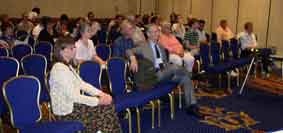 On Friday afternoon, Robert L.
Rogers presented his paper on "Green"
Starts With the Letter "S" (see presentation),
exploring whether there are methodologies of building design based in
nature which can utilize Baha'i principles for their implementation. The
construction of buildings and communities requires huge investments in
energy, materials, land, finances, and commitments to the future. He
focused on 5 elements of sustainability: seed, sky, soil, skin and
systems, broken into components which seek to encompass all aspects of
building and site design. Baha'i principles such as honesty, justice, and
a world-encompassing perspective can help to ensure that a project follows
through with green design commitments.
On Friday afternoon, Robert L.
Rogers presented his paper on "Green"
Starts With the Letter "S" (see presentation),
exploring whether there are methodologies of building design based in
nature which can utilize Baha'i principles for their implementation. The
construction of buildings and communities requires huge investments in
energy, materials, land, finances, and commitments to the future. He
focused on 5 elements of sustainability: seed, sky, soil, skin and
systems, broken into components which seek to encompass all aspects of
building and site design. Baha'i principles such as honesty, justice, and
a world-encompassing perspective can help to ensure that a project follows
through with green design commitments.
In the commitment and rush to “green everything”, there is a need to step back and take a more holistic look at buildings and how they relate to the larger ecosystems. Since nature builds many structures, we can learn design and building process from nature's approach to creating trees and other life forms. Rogers is dissatisfied with current building design methodologies, even though programs such as LEED have helped bring new levels of commitment to environmental considerations in building design and construction. There is still a need for a more “organic” approach which recognizes the vast laboratory that is called nature. The Baha'i input is important in helping us to be accountable in translating what we say into what we do. Rather than 3rd party certification processes as a way of ensuring compliance with green design principles, incorporating principles of integrity and world-embracing perspectives into the process itself is a more important and lasting way of changing the way our environments are conceptualized, designed, and then built.
In the second paper, Environment and Its Effects on the Spiritual Life of Man, Dr. Hamid Farabi and Ruhiyyih Farabi (see presentation) showed that mankind has been created with a spiritual and material nature, which is designed to exist in harmony with the environment. When an imbalance occurs and material greed increases, this is reflected in the environment, which is gradually destroyed. The spiritual nature is also weakened and the overall effect is a further increase in selfishness and greed, as individuals seek to acquire for themselves the ever-decreasing resources of the environment, which consequently undergoes further destruction. The balance must be rectified by developing mankind’s spiritual qualities.
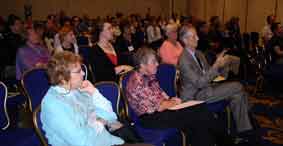 The Ferabis explored how spirituality and the environment are
inter-related. Everything in nature has been created by God for the
benefit of mankind. Mankind has been created with both spiritual and
physical needs which are satisfied when he lives in harmony with his
environment. However, if either side of his nature is neglected, he will
become unbalanced and the environment will also be disturbed. Human beings
rely upon nature for their survival. God has created them with free will
and the power of rational thinking, thus enabling them to control and
change the environment. This power is a tremendous responsibility, which
humanity has abused. In a vicious downward spiral, mankind’s perverted
spiritual nature manifests the qualities of greed, selfishness, ignorance
and excessive materialism and as a result, most of the people of the world
are contributing towards the destruction of the environment. Consequently
the cycle of nature has become unbalanced and polluted and is no longer
conducive to man’s spiritual development. This leads to a further increase
in materialistic and individualistic sentiments and more destruction of
the environment results in order to satisfy unquenchable desires. There is
therefore, a need to develop the spiritual side of man’s nature, for only
then can the imbalance of nature be halted and reversed.
The Ferabis explored how spirituality and the environment are
inter-related. Everything in nature has been created by God for the
benefit of mankind. Mankind has been created with both spiritual and
physical needs which are satisfied when he lives in harmony with his
environment. However, if either side of his nature is neglected, he will
become unbalanced and the environment will also be disturbed. Human beings
rely upon nature for their survival. God has created them with free will
and the power of rational thinking, thus enabling them to control and
change the environment. This power is a tremendous responsibility, which
humanity has abused. In a vicious downward spiral, mankind’s perverted
spiritual nature manifests the qualities of greed, selfishness, ignorance
and excessive materialism and as a result, most of the people of the world
are contributing towards the destruction of the environment. Consequently
the cycle of nature has become unbalanced and polluted and is no longer
conducive to man’s spiritual development. This leads to a further increase
in materialistic and individualistic sentiments and more destruction of
the environment results in order to satisfy unquenchable desires. There is
therefore, a need to develop the spiritual side of man’s nature, for only
then can the imbalance of nature be halted and reversed.
SATURDAY 15 AUGUST
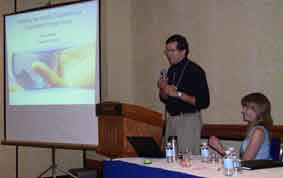 In the afternoon IEF Breakout Session,
Lawrence Staudt and Anne
Gillette presented their paper on
Assisting the World’s Transition to a Sustainable Energy Future
(see presentation and
full paper, or download
paper as doc), proposing a vision for a sustainable energy future
based on Bahá’í teachings. They looked at some of the practical steps and
processes required on the way to achieving that vision, considering a
stakeholder-driven California initiative as a case study.
In the afternoon IEF Breakout Session,
Lawrence Staudt and Anne
Gillette presented their paper on
Assisting the World’s Transition to a Sustainable Energy Future
(see presentation and
full paper, or download
paper as doc), proposing a vision for a sustainable energy future
based on Bahá’í teachings. They looked at some of the practical steps and
processes required on the way to achieving that vision, considering a
stakeholder-driven California initiative as a case study.
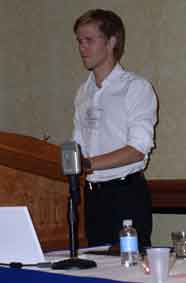 The presentation by Samuel Benoit
on Faith
in Environmentalism explored the role that the faculties of faith
and hope may play in the modern environmental movement in the face of
catastrophic climate change. What motivates activists to practice and
advocate environmental stewardship in the face of the looming thresholds
for runaway climate change? This interplay between faith, hope, reason and
rationality is paralleled in ‘Abdu’l-Bahá’s teachings on science and
religion. Benoit explored the role of religion in the history and thinking
of the modern environmental movement, and reviewed some of the recent
conclusions of the Intergovernmental Panel on Climate Change so championed
by the movement and how the faculty of reason or rationality might dictate
defeat. There are signs of faith and hope in the behaviour, words and
actions of environmentalists according to their leaders, history and other
studies. If faith and hope do motivate environmentalists, how did they
pervade this apparently secular social movement? Religion may serve an
essential role in the coming period to nurture the motivating faith and
hope that might be humanity’s last chance not to cross the critical
thresholds for catastrophic climate change.
The presentation by Samuel Benoit
on Faith
in Environmentalism explored the role that the faculties of faith
and hope may play in the modern environmental movement in the face of
catastrophic climate change. What motivates activists to practice and
advocate environmental stewardship in the face of the looming thresholds
for runaway climate change? This interplay between faith, hope, reason and
rationality is paralleled in ‘Abdu’l-Bahá’s teachings on science and
religion. Benoit explored the role of religion in the history and thinking
of the modern environmental movement, and reviewed some of the recent
conclusions of the Intergovernmental Panel on Climate Change so championed
by the movement and how the faculty of reason or rationality might dictate
defeat. There are signs of faith and hope in the behaviour, words and
actions of environmentalists according to their leaders, history and other
studies. If faith and hope do motivate environmentalists, how did they
pervade this apparently secular social movement? Religion may serve an
essential role in the coming period to nurture the motivating faith and
hope that might be humanity’s last chance not to cross the critical
thresholds for catastrophic climate change.
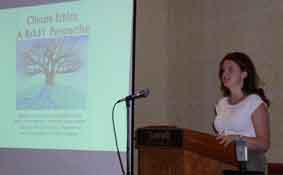
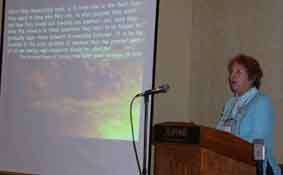 The discourse on climate change
is now a core part of informed debates concerning humanity’s future.
Authoritative assessments of its potentially catastrophic nature and scope
have seized the attention of governments and peoples alike. The search for
solutions to mitigate and adapt to climate change has revealed the limits
of traditional technological and policy approaches and raised difficult
ethical questions about justice, equity, responsibility and obligation.
Concurrently, the issue has provided humanity with a tremendous
opportunity – to take the next step in the transition from state-centered
governance to approaches that embrace humanity’s oneness and the global
nature of the challenge. A final interactive session on Climate
Ethics facilitated by Peter
Adriance and Duncan Hanks
started with Tahirih Naylor
highlighting the Bahá'í International Community’s work on climate ethics
(see powerpoint). Carol
Curtis then presented a case study on the Marshall Islands, one of
the small island developing states threatened by climate change and sea
level rise. Working groups were then formed to explore the issue through
selected case studies (see
case studies and instructions).
The discourse on climate change
is now a core part of informed debates concerning humanity’s future.
Authoritative assessments of its potentially catastrophic nature and scope
have seized the attention of governments and peoples alike. The search for
solutions to mitigate and adapt to climate change has revealed the limits
of traditional technological and policy approaches and raised difficult
ethical questions about justice, equity, responsibility and obligation.
Concurrently, the issue has provided humanity with a tremendous
opportunity – to take the next step in the transition from state-centered
governance to approaches that embrace humanity’s oneness and the global
nature of the challenge. A final interactive session on Climate
Ethics facilitated by Peter
Adriance and Duncan Hanks
started with Tahirih Naylor
highlighting the Bahá'í International Community’s work on climate ethics
(see powerpoint). Carol
Curtis then presented a case study on the Marshall Islands, one of
the small island developing states threatened by climate change and sea
level rise. Working groups were then formed to explore the issue through
selected case studies (see
case studies and instructions).
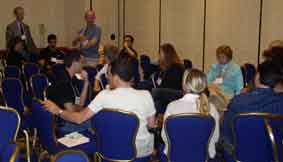
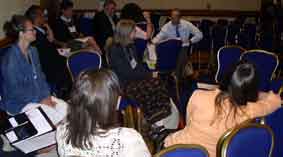
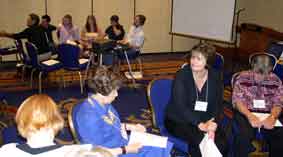
Working groups
E-conference
The e-conference this year was organized as a blog at http://iefconf2009.wordpress.com/ with many features available to all e-participants. Several bloggers reported on the plenary and breakout sessions. There was also a Twitter site for the conference. Audio and video recordings of the plenary sessions will be available later on this site.
Annual General Assembly of the IEF
IEF members, professionals interested in becoming a member of the IEF, and others interested in learning more about the activities of the Forum gathered for the IEF Annual General Assembly on Friday evening 14 August 2009. See separate report.

Last updated 10 January 2010

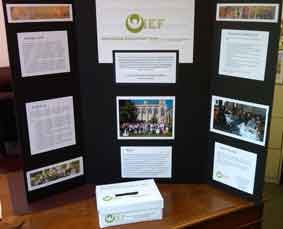 IEF exhibit at the conference
IEF exhibit at the conference